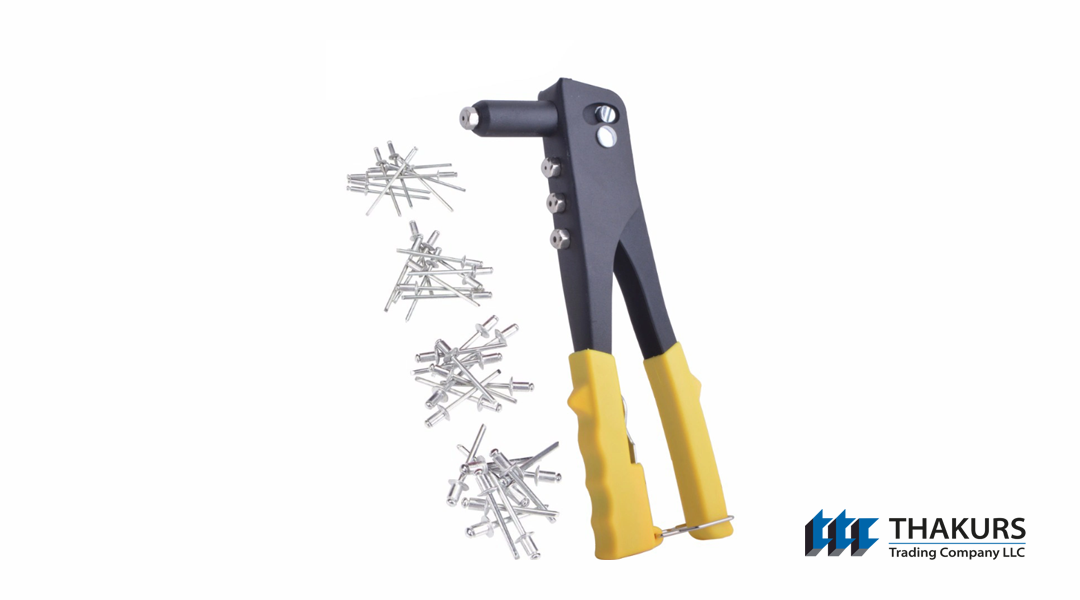
A Riveter is a tool used to fasten two pieces of material together using a rivet. Rivets are small metal pins with a head on one end and a shank on the other. The riveter uses a pulling mechanism to deform the shank of the rivet, creating a permanent joint between the two pieces of material.
There are several types of riveters available, including hand-held manual riveters and powered riveting tools. The most common type of riveter is the hand-held manual riveter, which requires squeezing the handles together to pull the rivet through the materials.
There are also several types of rivets available, including solid rivets, blind rivets, and tubular rivets. Solid rivets are used in applications where the joint must be extremely strong and permanent, such as in aircraft construction. Blind rivets, also known as pop rivets, are used in applications where access to both sides of the joint is limited, such as in sheet metal and automotive applications. Tubular rivets are used in applications where the joint must be watertight or airtight, such as in marine and HVAC applications.
When selecting a riveter, it’s important to consider the size and type of rivets being used, as well as the thickness and type of material being joined. It’s also important to ensure that the riveter can generate enough pulling force to properly deform the rivet shank and create a secure joint.
Riveters come in different sizes and types depending on the specific application and the size of the rivets being used. Here are some common types of riveters and the sizes they typically handle:
- Hand-held manual riveters: These are the most common type of riveters and come in different sizes to handle different rivet sizes. They typically handle rivets ranging from 3/32 inch (2.4mm) to 3/16 inch (4.8mm) in diameter.
- Leveraged riveters: These are similar to hand-held manual riveters but have a longer handle that provides additional leverage, making it easier to pull larger diameter rivets. They typically handle rivets ranging from 3/16 inch (4.8mm) to 1/4 inch (6.4mm) in diameter.
- Pneumatic riveters: These are powered by compressed air and are ideal for high-volume production applications. They typically handle larger diameter rivets ranging from 1/4 inch (6.4mm) to 1/2 inch (12.7mm) in diameter.
- Hydraulic riveters: These are similar to pneumatic riveters but are powered by hydraulic pressure. They are used for heavy-duty applications and can handle rivets up to 1 inch (25.4mm) in diameter.
- Cordless riveters: These are battery-powered and offer the convenience of portability and ease of use. They typically handle rivets up to 1/4 inch (6.4mm) in diameter.
There are also different types of rivets available, and each type requires a specific type of riveter to install it properly. The most common types of rivets include:
- Solid rivets: These are the strongest and most durable type of rivet and are used in heavy-duty applications. They require a solid rivet gun or a pneumatic or hydraulic riveter to install.
- Blind rivets (pop rivets): These are the most common type of rivet and are used in applications where access to both sides of the material is limited. They require a hand-held or pneumatic blind rivet gun to install.
- Tubular rivets: These are used in applications where the joint must be watertight or airtight. They require a special tubular rivet tool to install.
- Drive rivets: These are used in applications where a large amount of clamping force is required. They require a hand-held or pneumatic drive rivet tool to install.
It’s important to choose the correct type and size of riveter for the specific application and to follow the manufacturer’s instructions for safe and proper use.
